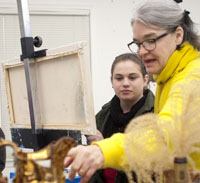Why I Give: Q&A With Elizabeth "Betsy" Krome '71

A full-time potter, Elizabeth "Betsy" Krome '71 is making a lasting impact on Randolph students through a gift in her will.
Q. What's your life like now?
A. I am a full-time potter. After nearly three decades in a potters' coop, I now run a one-woman business, Quail Run Pottery, working in a studio behind our rural home. I make pots for everyday use, selling wholesale and at art shows, and teaching clay classes for adults. Many '71 classmates have retired, but I am enjoying clay more than ever and I can't envision giving it up soon.
The other important commitment in my life, besides my family, is to a Quaker outdoors camp, where I have worked in the kitchen for 25 summers. This work is a total contrast to my solitary days with clay: I manage a staff of volunteers cooking for 100 lively campers and staff.
Q. What are your favorite memories from your college days?
A. Much of my college experience revolved around the Sundial, which I edited. Two aspects of that responsibility have shaped my life.
First, being entrusted with the leadership of the newspaper, with weekly deadlines, a variety of daily tasks and a staff of volunteers encouraged me to think that running my own business was not an outlandish idea.
Second, the experience of motivating those volunteers to produce a weekly newspaper has been helpful to me, both in my continuing summer work as a kitchen manager and in the 1990s when I co-founded a Montessori school and headed the parent board for five years. I often say that my R-MWC education prepared me to tackle any number of things I wasn't qualified for, and the Sundial was a big part of that education.
Q. Why have you chosen to support the College through a bequest?
A. For the same reason I've always supported the Annual Fund. Both my daughter (Margaret Krome-Lukens '07) and I received scholarships that made our R-MWC attendance possible, and it feels like the simplest-ever Pay It Forward. I am grateful to the generous alumnae whose resources are changing the lives of young people, and I want to be one of them.
When my husband and I updated our wills a few years ago, it was a chance to consider questions wider than how to provide for our children. I strongly believe in the virtues of a liberal arts education, and giving to Randolph feels like a great way to make good on that belief.
Q. If you could go back to your college-age self, what advice would you give her?
A. I'd say, 'Quit focusing on your journalism career (you're going to give it up at age 22) and take Music Appreciation and Art History.' My advisor, Dr. Cornelius, offered me this advice repeatedly, but I was not smart enough to take it.
Pay It Forward at Randolph College
There are many ways you, like Betsy, can make an impact on Randolph students in the future. Contact The Planned Giving Office at plannedgiving@randolphcollege.edu or 434-485-8050 to learn more.

